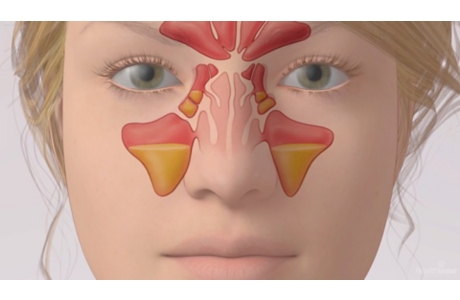Overview
Most of the time it is best to do your saltwater (saline) nasal wash before you use your other nasal medicines. The wash will help your sinuses absorb the medicine.
Saltwater washes (saline lavage or irrigation) help keep the nasal passages open by washing out thick or dried mucus and allergens. They can also help the tiny hairs that line the sinuses work better to keep the sinuses healthy. This can help prevent the spread of infection to the other sinuses and reduce postnasal drip. It also can make the nose feel more comfortable by keeping the mucous membranes moist.
- Make your saltwater solution.
- Add 2 cups (473 mL) distilled water to a clean container.
If you use tap water, boil it first to sterilize it. Let it cool until it's lukewarm.
- Add 1 tsp (5 mL) non-iodized salt to the water.
- Add 1 tsp (5 mL) baking soda.
- Add 2 cups (473 mL) distilled water to a clean container.
- Wash your sinuses.
- Warm the solution a little, if you want.
But make sure it's not hot.
- Fill a large medical syringe, squeeze bottle, or nasal cleansing pot (such as a neti pot) with the saline solution.
- Insert the tip into your nostril, lean over the sink, and squeeze gently.
- Aim the stream of saline solution toward the back of your head, not toward the top.
- The saline wash should go in one nostril and out the other side. Sometimes it comes out the mouth.
- Repeat on the other side.
- Warm the solution a little, if you want.
- Blow your nose gently after the saline wash unless your doctor has told you not to blow your nose.
The saline wash may cause a burning feeling in your nose the first few times you use it. Most people get used to the wash after a few times.
- Repeat several times every day.
- Clean the syringe or bottle after each use.
- You can store homemade saline solution at room temperature for 3 days.
Related Information
Credits
Current as of: September 27, 2023
Author: Healthwise Staff
Clinical Review Board
All Healthwise education is reviewed by a team that includes physicians, nurses, advanced practitioners, registered dieticians, and other healthcare professionals.
Current as of: September 27, 2023
Author: Healthwise Staff
Clinical Review Board
All Healthwise education is reviewed by a team that includes physicians, nurses, advanced practitioners, registered dieticians, and other healthcare professionals.


